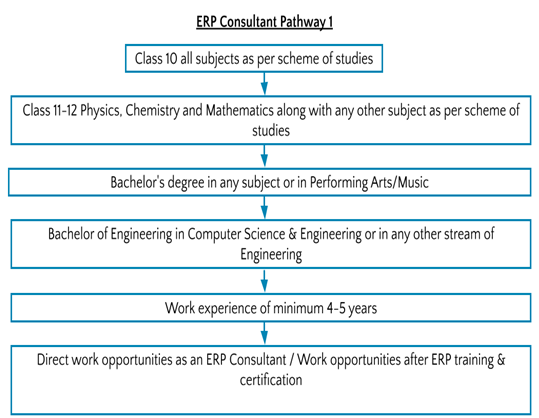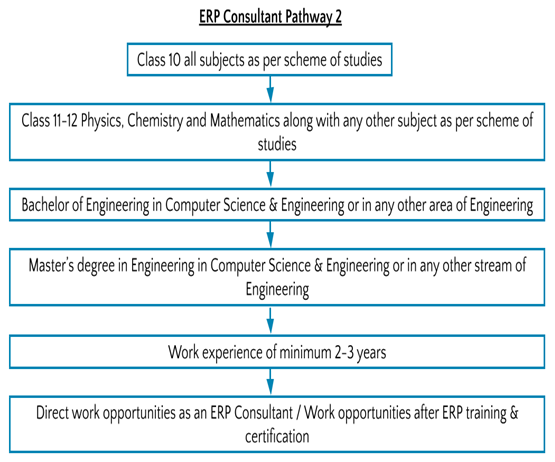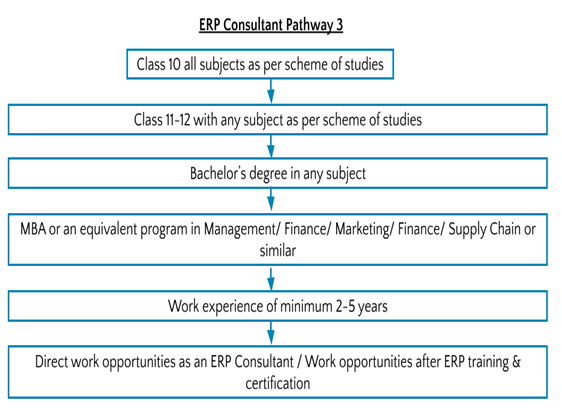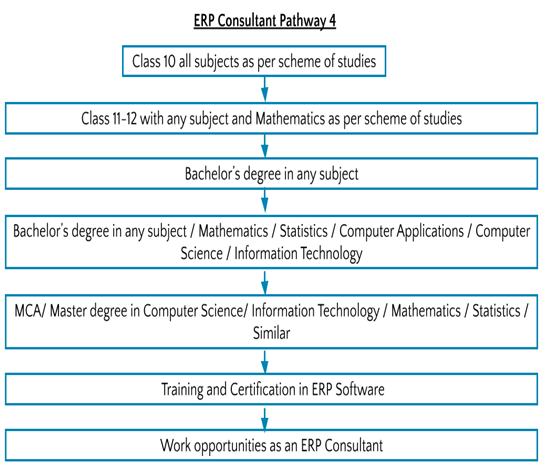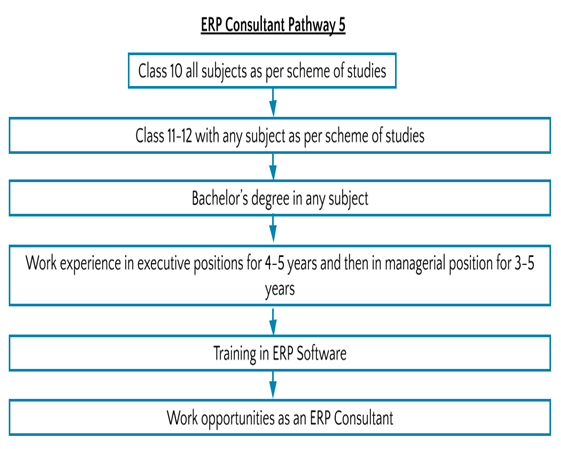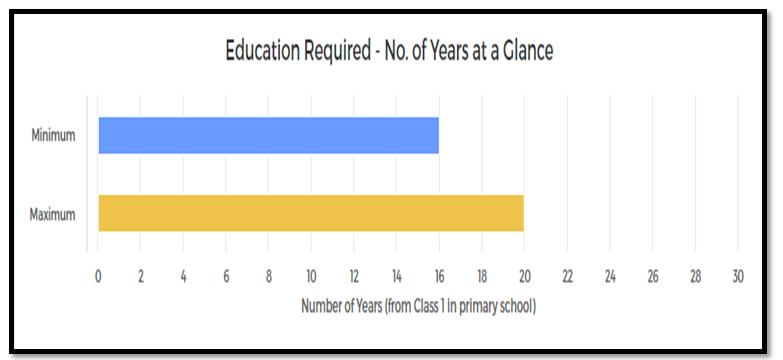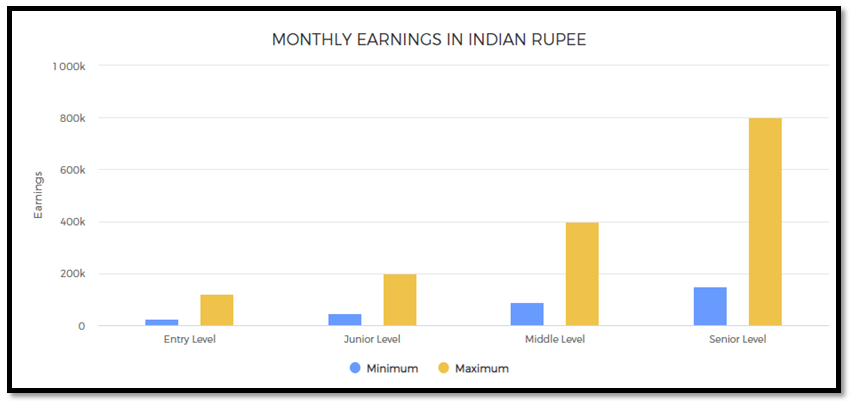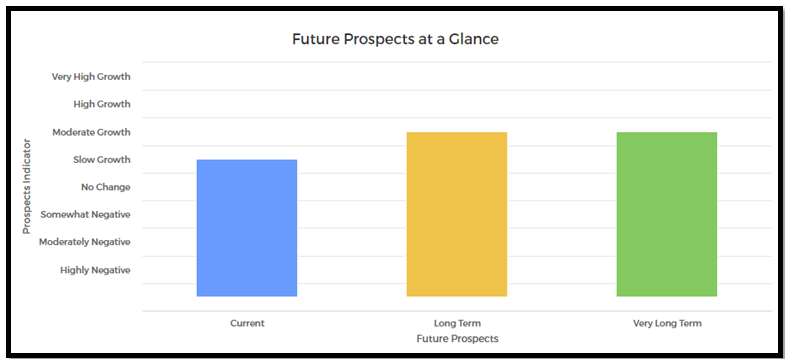ERP Consultant
Entry Level Qualification
12
Career Fields
Business & Management
For Specially Abled






About Career
PARTICULARS | DESCRIPTION |
Name | ERP Consultant |
Purpose | Implement And Optimize ERP Systems |
Career Field | Business & Management |
Required Entrance Exam | CAT, CUET UG |
Average Salary | 300000 - 1500000 Rs. Per Year |
Companies For You | Sap India, Oracle India, Infosys & Many More |
Who is Eligible | Class 12th Pass |
ERP stands for Enterprise Resource Planning. Enterprise Resource Planning is a methodology which allows an organisation’s management, which is using it, to have an integrated or overall view of:
1. The various business processes in the organisation (such as marketing, sales, distribution, accounting, financial management, production, logistics, human resources management, etc.),
2. Track use of resources (such as raw materials, money, production capacity, and human resources),
3. Track the status of receivables and stocks (revenue, purchase orders, raw materials, etc.), and
4. Track the status of business commitments and liabilities (such as orders received and to be filled, money to be paid, salaries to be paid, etc.).
ERP is driven by technologies – or software
Obviously, as you might have guessed rightly – ERP is done fully with the use of a suite of software called ERP software (a software suite is a set or collection of computer software which use similar user interfaces and configurations). Some of the most popular ERP Software suites are – SAP, Oracle, NetSuite ERP, Microsoft Dynamics GP, Epicor ERP, etc.
ERP software integrates all the processes of a business in real-time and thereby improves the organisation’s business processes and decision making abilities. ERP leads to reduction of human errors in business process; makes processes faster and more efficient; and ultimately leads to saving of costs.
Real time integrated or overall view of business processes with the help of ERP
ERP software suites help an organisation’s management to have an integrated or overall view of the business processes in real-time, meaning at any time. This helps in taking operational and managerial decisions. Decisions such as how much raw materials to order, when and from where; how much stock of raw materials and other resources to maintain in order to meet customer demands; how much quantity of products to dispatch for distribution and sales; how much cash to have in hand to spend for various day-to-day purposes; how much salaries to be paid; how many people to recruit, and so on.
Data analysis and decision making with the help of ERP
More importantly, ERP software suites help an organisation’s management to compile, store, analyse, interpret, and view data from various business operations. This helps the management to take important decisions. For example, the management may analyse the productivity and wastage in the production process and make decisions as to how to improve productivity and reduce wastage. They may analyse the time it takes to order and receive raw materials and then take a decision as to how to reduce the time.
What do ERP Consultants do?
ERP Consultants have two primary roles – Technical and Functional. Although these days, the two roles are merging, but it is important to know the differences.
ERP software suites are developed and programmed by Technical Consultants who are software programmers. Most ERP software suites can be bought and then customised according to the specific needs of an organisation. ERP Technical Consultants help organisations to customise. This needs programming and development.
Technical Consultants have to be expert in the knowledge of the various functionalities of an ERP software suite and should also know how to program the software suite to fit the requirement of a business organisation. For example in SAP – Technical Consultants will know about SAP Basis (this is SAP system administration platform such as SAP R/3 and SAP S/4 – meaning other SAP application software are run on and managed through SAP Basis), SAP ABAP (SAP Advanced Business Application Programming), and SAP Security (for system and data security).
Functional Consultants bring the business process or functional knowledge to the table which helps Technical Consultants to understand the business process and process flow; understand what to develop, and program. Functional Consultants have the business knowledge, say, knowledge of financial transaction in a business, process of raw materials ordering in a business, human resource management processes, and so on. Functional Consultants generally specialise in a given business domain. Functional Consultants communicate with the clients primarily to understand their business processes. They understand what customisation of an ERP Suite is required and convey that to the Technical Consultant.
Functional Consultants help client organisations to implement ERP Software systems by configuring and installing the systems into the client computers. They communicate with the Technical Consultants during the installation and deployment processes to troubleshoot bugs and other errors. In general, implementing ERP software systems is a complicated and long process. Functional Consultants help in that.
A few common modules of software available with most ERP Software suites such as SAP and Oracle
Human Resources: HR module helps in the management of employee information, tracking employee records, like performance reviews, designations, job description, skill matrix, attendance, and time tracking. One of the principal submodules in the HR module is Payroll System which helps to manage employee salaries, payment reports, travel expenses, and reimbursements.
Materials / Inventory: Materials/Inventory module helps track the stock of items identified by unique serial numbers. The functionalities include inventory control, master units, stock utilization reporting, etc.
Sales &Distribution: Under sales and distribution module, all the sales transactions such as Sales queries & inquiry analysis & handling, quotation drafting, accepting sales orders, drafting sales invoices with proper taxation, dispatch/Shipment of material or service, tracking pending sales order.
Finance & Accounting: Finance & Accounting Module keeps track of all account-related transactions such as expenditures, balance sheet, account ledger, bank statements, payment receipts, and tax management. The inflow and outflow of money is managed by the Finance & Accounting Module.
Customer Relationship Management (CRM): Customer Relationship Management or CRM module helps in managing and tracking detailed information of the customer service like communication history, calls, meetings, details of purchases made by the customer, contract duration, etc. CRM Module helps in boosting sales performance through better customer service.
Engineering/ Production: Functionalities included under Engineering & Production module are production planning, raw material usage, tracking Production order control, order planning, order statistics, order subcontracting, project scheduling, project costs among many others.
Supply Chain Management (SCM): Supply Chain Management module manages the flow of product items from manufacturer to consumer and vice versa. It involves demand & supply management, sales returns & replacing process, shipping & transportation tracking, etc.
Business Analysis and Business Intelligence (BA & BI): BA & BI modules help in compilation of business process data, storage of data, mining and analysis of data, data interpretation and data visualisation.
Key Roles and Responsibilities
As an ERP Consultant, you will be involved in the following key roles and responsibilities:
1. You will be involved in managingof ERP implementation starting from understanding the business processes of an organization till project management and designing of different phases of ERP implementation which includes- Customizations, integration, support, understanding of forms, fields, workflows etc.
2. You will ensure that the organization implement complete solution that meet their business needs and lead the client project throughout the development and the support phases.
3. You will also help in business requirement analysis, define objectives of ERP, and transform organization processes at optimum level.
4. You will also be involved in resolving complex processes issues and data mining into the solution.
5. You will coordinate with other branches of the company to ensure their needs are met in any upgrades of the system. They will then develop a cohesive plan to be presented to the relevant company management.
6. You will also be helping the organization with training either at client side or online to make the end user understand how the software works.
7. You will lead multiple projects or lead to implement new functionalities and improve existing functionalities including articulating, analysing requirements and translating them into effective solutions.
Career Entry Pathway
Class 10 all subjects as per scheme of studies – Class 11-12 Physics, Chemistry and Mathematics along with any other subject as per scheme of studies – Bachelor of Engineering in Computer Science & Engineering or in any other stream of Engineering – Work experience of minimum 4-5 years – Direct work opportunities as an ERP Consultant / Work opportunities after ERP training & certification
After completing Class 11-12 Physics, Chemistry and Mathematics along with any other subject as per scheme of studies you can go for Bachelors of Engineering in Computer Science & Engineering or in any other stream of engineering. After graduation you can start working as a professional and gain a work experience of around 4-5 years in any industry. Then you may get work opportunities with companies which may train you or you can do an ERP certification course first and then apply for jobs. If you are passing out from a premier engineering institution, you may get campus placement as an ERP Consultant and then the recruiting company may train you.
Class 10 all subjects as per scheme of studies – Class 11-12 Physics, Chemistry and Mathematics along with any other subject as per scheme of studies – Bachelor of Engineering in Computer Science & Engineering or in any other stream of Engineering – Master’s degree in Engineering in Computer Science & Engineering or in any other stream of Engineering - Work experience of minimum 2-3 years – Direct work opportunities as an ERP Consultant / Work opportunities after ERP training & certification
After completing Class 11-12 Physics, Chemistry and Mathematics along with any other subject as per scheme of studies, you can pursue Bachelor of Engineering in computer science & Engineering or in any other stream of engineering. After a graduation degree you can go for a Master’s degree in Engineering in Computer Science & Engineering or in any other stream of Engineering. With a degree in master’s you can acquire a work experience in an industry for a minimum of 2-3 years. You may then get work opportunities as an ERP Consultant with companies which may train you or you can do an ERP certification course first and then apply for jobs. Applying for jobs after getting ERP training and certification is a better option.
Class 10 all subjects as per scheme of studies – Class 11-12 with any subject as per scheme of studies – Bachelor’s degree in any subject – MBA or an equivalent program in Management/ Finance/ Marketing/ Finance/ Supply Chain or similar – Work experience of minimum 2-5 years – Direct work opportunities as an ERP Consultant / Work opportunities after ERP training & certification
After completing Class 11-12 with any subject as per scheme of studies you can pursue graduation in any subject. After having completed a bachelor’s degree you can go for MBA in Management/Finance/Marketing/Finance/Supply Chain or in similar specialisation. Then, you should work in any industry for a minimum of 2-5 years. Then you may get a work opportunity as an ERP Consultant with companies which may train you or you can do an ERP certification course first and then apply for jobs in the role of an ERP Consultant. However, getting an ERP Certification first and then applying for jobs is a better option. If you are passing out from a premier Business School, you may also get a campus placement as an ERP consultant. The recruiting company would train you. It is also not impossible to get campus placement (at a good Business School) in ERP after having an MBA or an equivalent program with additional training and certification in ERP software.
Class 10 all subjects as per scheme of studies – Class 11-12 with any subject and Mathematics as per scheme of studies – Bachelor’s degree in any subject / Mathematics / Statistics / Computer Applications / Computer Science / Information Technology – MCA/ Master degree in Computer Science/ Information Technology / Mathematics / Statistics / Similar – Training and Certification in ERP Software – Work opportunities as an ERP Consultant
After completing Class 11-12 with any subject and Mathematics as per scheme of studies with Mathematics, you can pursue Bachelor’s degree in any subject / Mathematics / Statistics / Computer Applications / Computer Science / Information Technology. After having pursued graduation you can go for further studies in similar field i.e. MCA/Master’s degree in Computer Science/ Information Technology/ Mathematics/ Statistics/ similar. After acquiring a master’s degree you can go for a training and certification in ERP Software to get prior knowledge which will help you in getting work opportunities as an ERP Consultant. It is a bit difficult to get a job in this way, but not impossible.
Class 10 all subjects as per scheme of studies – Class 11-12 with any subject as per scheme of studies – Bachelor’s degree in any subject – Work experience in executive positions for 4-5 years and then in managerial position for 3-5 years – Training in ERP Software – Work opportunities as an ERP Consultant
After completing Class 11-12 with any subject as per scheme of studies, you can go for a Bachelor’s degree in any subject. After your bachelor’s you can start working in any industry and grow up to a managerial position. After having a work experience for a total of about 8-10 years (our of which, experience of 3-5 years in a managerial position), you can get a training and certification in ERP Software. Then you can apply for a job as an ERP Consultant.
Required Qualification & Competencies
Remember that it is better to study Science and Mathematics in school (up to class 10) and Mathematics up to Class 12. But well, it’s not mandatory. Also remember that getting an ERP training and certification from a training centre authorised by an ERP Software development company is a better way to ensure a career in this field. But if you are from a premier engineering or business school, it is not impossible to get a campus placement straight after your B.E. / B.Tech. and MBA.
However, almost all companies which recruit in ERP Consultant’s roles, prefer that the candidates have 2-5 or more years of functional experience in a business. The more work experience you have, along with ERP training & certification, the more eligible you are to get a good job in this field.
For your Bachelor’s / Master’s degree, you can opt to study in any one of the following fields or even study for a Bachelor’s degree in any subject that you prefer:
1. Computer Science & Engineering
2. Any field of Engineering other than Computer Science & Engineering
3. Business Administration / Business Management (at Master’s level)
4. Computer Science
5. Computer Applications
6. Information Technology
7. Mathematics
8. Statistics
9. Any academic field similar to the above
MINIMUM EDUCATION REQUIRED | MAXIMUM EDUCATION REQUIRED |
Under Graduate Undergraduate Degree / Honours Diploma / Graduate Diploma (equivalent to a Degree) Programs for which the minimum eligibility is a pass in Higher Secondary / Class XII School Leaving examination. | Post Graduate Postgraduate Degree / Diploma / Certificate Programs for which the minimum eligibility is a pass in Graduation / equivalent Diploma program like Honours Diploma or Graduate Diploma. |
COMPETENCIES REQUIRED
Interests
1. Realistic: You should have interests for Realistic Occupations. Realistic occupations involve more practical and hands-on activities than paperwork or office work. Realistic occupations often involve physical activities for getting things done using various tools and equipment.
2. Investigative: You should have interests for Investigative Occupations. Investigative occupations involve working with ideas and quite a lot of thinking, often abstract or conceptual thinking. These involve learning about facts and figures; involve use of data analysis, assessment of situations, decision making and problem solving.
3. Enterprising: You should have interests for Enterprising Occupations. Enterprising occupations involve taking initiatives, initiating actions, and planning to achieve goals, often business goals. These involve gathering resources and leading people to get things done. These require decision making, risk taking and action orientation.
Abilities
1. Articulation: The ability to speak clearly so others can understand you.
2. Deductive Reasoning: The ability to apply general rules and common logic to specific problems to produce answers that are logical and make sense. For example, understanding the reasons behind an event or a situation using general rules and common logic.
3. Fluency of Ideas: The ability to come up with a number of ideas about a topic (the number of ideas is important, not their quality, correctness, or creativity).
4. Inductive Reasoning: The ability to combine pieces of information from various sources, concepts, and theories to form general rules or conclusions. For example, analysing various events or situations to come out with a set of rules or conclusions.
5. Inter-Personal: The ability to build and maintain good relationships with others at workplaces and elsewhere.
6. Numerical Reasoning: The ability to add, subtract, multiply, divide, and perform other basic numerical calculations correctly.
7. Oral Expression: The ability to communicate information and ideas in speaking so others will understand.
8. Problem Sensitivity: The ability to tell when something is wrong or is likely to go wrong. It does not involve solving the problem, only recognizing there is a problem.
9. Selective Attention: The ability to concentrate on a task over a long period of time without being distracted.
10. Speed of Closure: The ability to quickly make sense of, combine, and organize information into meaningful patterns.
11. Verbal Reasoning: The ability to think and reason with words; the ability to reason out ideas expressed in words.
Knowledge
1. Software: Knowledge of various ERP Software training certifications such as: Oracle Cloud in SaaS – ERP, HCM, CX, SCM Certification or certifications in software/hardware in Applications, Business Intelligence etc; SAP certifications in ERP – SAP Basis, SAP ABPA, SAP S/4HANA, SAP CRM, SAP ME and MII etc.
2. Business Management: Knowledge of managing a business which involves planning of what to do, organising resources and people, leading and supervising work activities of people, and monitoring performances of people as well as performance of business. This includes knowledge of marketing, finance, human resources management, operations management, etc.
3. Customer Service: Knowledge about how to provide customer services. This includes understanding customer needs, helping customers to use products and services, answering customer queries, handling customer complaints and grievances, and evaluating customer satisfaction.
4. Human Resources: Knowledge about the theories and procedures for recruitment, selection, induction, placement, compensation, performance management, training and development and various other aspects of human resources in organisations.
5. Marketing: Knowledge of the various principles, theories, methods, systems and processes to understand the needs of a category of customers and then creating, communicating, and delivering various products and services in order to satisfy the needs of the customers.
6. Production and Processing: Knowledge of raw materials, production machinery, production systems, production processes, quality control, and other techniques for manufacturing or construction and distribution of goods.
7. Sales and Promotion: Knowledge of the various principles, theories, methods, systems and processes to communicate and promote the benefits of various products or services of an organisation to a targeted group of customers, influencing their buying decisions and convincing them to buy the products or services.
Skills
1. Active Learning: Focused and continuous learning from various sources of information, observation and otherwise for application in getting work done.
2. Active Listening: Giving full attention to what other people are saying, understanding the points being made by others, asking questions, etc.
3. Communication in English: Skills in communicating effectively in writing as well as verbally with others in English language.
4. Coordination: Skills in working together with other people to get things done.
5. Critical Thinking: Skills in analysis of complex situations, using of logic and reasoning to understand the situations and take appropriate actions or make interpretations and inferences.
6. Directing: Skills in directing others' actions to get things done.
7. Instruction: Skills in training others how to do something.
8. Judgment and Decision Making: Skills in considering pros and cons of various decision alternatives; considering costs and benefits; taking appropriate and suitable decisions.
9. Managing Financial Resources: Skills in determining how money should be spent to get the work done, and accounting for these expenditures.
10. Managing Human Resources: Skills in motivating, developing, and leading people as they work, identifying the best people for the job.
11. Managing Material Resources: Skills in sourcing, buying, storing, and use of appropriate raw materials, machines, equipment, and devices for various purposes such as industrial manufacturing, building construction, etc.
12. Negotiation: Skills in bringing others together and trying to reconcile differences.
13. Operations and Process Analysis: Skills in analysis of operations and processes such as industrial manufacturing, chemical processing, etc. so as to device better and more efficient operational processes and systems.
14. Problem Solving: Skills in analysis and understanding of problems, evaluating various options to solve the problems and using the best option to solve the problems.
15. Service Orientation: Skills in or keen interest to help and assist people.
16. Supervising: Skills in Supervising and monitoring performance of others, businesses, and different projects.
17. Time Management: Skills in prioritizing work, managing time effectively.
18. Writing: Skills in communicating effectively in writing as appropriate for the needs of the readers.
Personality
1. You are always or mostly organized in your day-to-day life and activities.
2. You are helpful to others sometimes.
3. You remain calm in difficult situations sometimes but some other times you are anxious.
4. You prefer to experience new things and have new experiences sometimes.
5. You are friendly and outgoing sometimes, but not always. You prefer company of people sometimes but not always.
6. You are caring, supportive, sympathetic and kind to others sometimes.
Career - Job Opportunities & Profiles
Following are some of the organisations where you can find jobs:
1. Core ERP Consultant Organisations such as: SAP, Ultra Consultants, Oracle, NetSuite, IPIX SYSPRO, Hyperlink Infosystem, IBM, Zenstar Technologies etc.
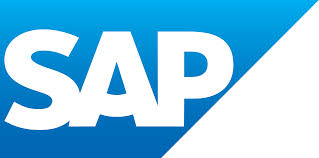

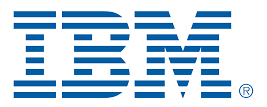
2. IT software and services companies such as: Tata Consultancy Services, Infosys, Wipro, IBM, Infosys, Tech Mahindra, HCL Technologies, Mphasis, Cognizant Technology Solutions, etc.
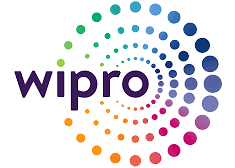
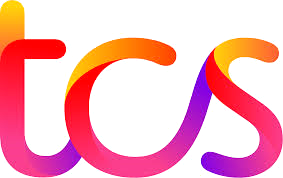

3. Management and financial services consulting companies such as: KPMG, Ernst & Young, Deloitte, PwC, etc.
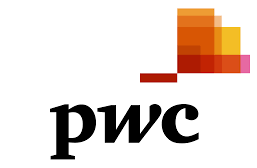

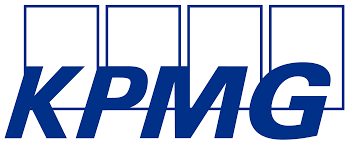
4. Top Banking software companies such as: Banking institutions use Core Banking Software or CBS products. Some of the companies are: Infosys, Trust Bank CBS, Finacus, Sesame.
5. IT departments of banks and financial institutions such as State Bank of India, ICICI Bank, LIC, Goldman Sachs, JP Morgan Chase, etc.
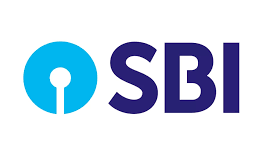
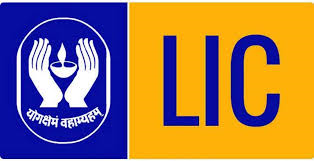
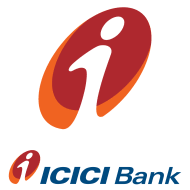
6. Telecommunication and Data Service Providers such as Reliance Jio, Airtel, Vodafone, etc.
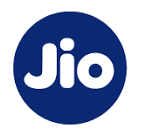
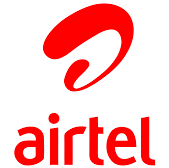
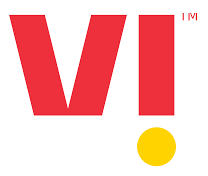
7. IT/ERP departments of various business organisations: Generally, large scale companies may have their own team of people for ERP implementation and support such as Reliance Industries Ltd., L&T, Tata Motors, etc.
At the beginning of your career, in most organisations, you will begin as an Analyst/ Associate and then work your way up.
SPECIALISATION TRACKS IN THIS CAREER
SAP ERP Certified Professional
SAP ERP Certified Professionals develop and program ERP software systems. They customise SAP ERP software to suit client organisations’ requirements. They configure SAP ERP systems, install ERP software, and provide technical support to SAP clients. They need to have skills in SAP Technical modules (such as SAP Basis, SAP ABAP, SAP Security, SAP Information Systems Management, SAP HANA, etc.). They need to have skills in various SAP Functional modules such as HRM, SD, CRM, HRM, SCM, FICO, etc.
Oracle ERP Cloud Certified Professional
Oracle ERP Certified Professionals design, implement and deploy Oracle solutions to achieve defined business goals. They modernize client’s business and core environments to leverage technology innovations around cloud, Digital, Mobility and social collaboration. They deal with products including Oracle Cloud SaaS, EBS, PeopleSoft, and JD Edwards. They help clients solve complex Finance, Supply chain, and IT challenges. They need to have good understanding of JD Edwards Finance Module i.e. General Ledger, Accounts Payable, Accounts Receivable, and Fixed Assets.
Microsoft Dynamics GP Certified Professional
Microsoft Dynamics GP Certified professionals will be responsible for reviewing client business processes, re-engineering the client’s processes to improve efficiency, and performing many of the functional tasks required for a successful GP implementation. They must have a good knowledge of the GP series, should have certified in Dynamics GP, and should have participated in all stages of lifecycle in multiple GP implementation projects. They will actively work to mitigate risks including company’s Project Management team by maintaining and adhering to a project plan and process.
NetSuite ERP Certified Professional
NetSuite ERP Certified Professionals are involved in the implementation, configuration, and maintenance of customers NetSuite solutions. They work closely with clients to create solution outlines and solution definitions for new requirements to extend the use of IFS. They are required to have a deep understanding of NetSuite functionality across the breadth of the product with a focus on Finance and Manufacturing, NetSuite reporting tools and dashboards. They are also required to be skilled in NetSuite Data migration tools.
CAREER GROWTH
You will begin your career as an Analyst or Associate. After this level, your career progression could be as given below depending on your level of expertise and work performance:
Business Technology Analyst – Consultant – Senior Consultant – Lead/ Principal Consultant – Associate Vice President – President/ Business Head – Managing Director
There are various other mid and senior level positions as well. In some organisations, you will progress as:
Senior Analyst – Lead Technology Analyst – Associate Consultant – Consultant – Senior Consultant – Associate Vice President - Vice President – President
Salary Offered
1. At an Entry-level, you may earn around Rs. 25,000 – 1,20,000 or even more per month. Higher level salaries are offered to passing out students of premier engineering and business schools.
2. At Junior-level, you may earn around Rs. 45,000 – 2,00,000 or even more per month.
3. At Mid-level, you may earn around Rs. 90,000 – 4,00,000 or even more per month.
4. At Senior-level, you may earn around Rs. 1,50,000 – 8,00,000 or even more per month.
MONTHLY EARNINGS IN INDIAN RUPEE
1. Entry level: 0 - 2 years of work experience
2. Junior Level: From 1 to 12 years of work experience
3. Mid-Level: From 5 to 20+ years of work experience
4. Senior Level: From 10 to 25+ years of work experience (there could be exceptions in some high-end technical, financial, engineering, creative, management, sports, and other careers; also in the near future, people will reach these levels much faster in many careers and in some careers, these levels will have no meaning as those careers will be completely tech skill driven such as even now, there is almost no level in a Cyber Security Expert’s job)
Work Activities
1. Computer Programming: Computing using various computer software applications and knowledge of commonly used tools implemented within ERP framework such as Agiloft Workflow, WorkflowGen, Inceptico DMS, Intelex Business Management, SimpleECM, etc.
2. Analysing and interpreting data and information: Analysis of data and information to find facts, trends, reasons behind situations, etc.; interpretation of data to aid in decision making.
3. Training and developing: Identifying training and professional development needs of others; training them to develop skills to perform tasks and improve performance.
4. Communicating with co-workers and others: Communicating with people in writing, verbally or otherwise inside your workplace and various other people who have professional relationships with your place of work including vendors, government officials, etc. or with people at large.
5. Communicating with clients: Communicating with potential and existing clients of your organisation in writing, verbally or otherwise.
6. Decision making and problem solving: Analysis of data and information; evaluation of alternative decisions and results of decisions; taking the right decisions and solving problems.
7. Developing and maintaining inter-personal relationships: Developing professional relationships with co-workers and others outside organisations and maintaining good relationships.
8. Estimating quantity, cost, time and resources: Estimating sizes, volumes, distance, and quantity; estimating and determining time, costs, and resources; estimating materials required to perform a task.
9. Getting Information and learning: Observing, hearing, reading, using computers, or otherwise obtaining information and learning from it.
10. Handling administrative activities: Handling various administrative tasks and managing day-to-day operations.
11. Leading: Inspiring and motivating co-workers to work to achieve specific goals; enabling and facilitating others to perform tasks effectively; addressing issues and solving problems in order to help people perform well.
12. Managing and supervising: Manging and supervising work of others; setting goals; giving instructions; monitoring work performance, etc.
13. Organising, planning and prioritising tasks: Planning and organising tasks in order to achieve work goals; prioritising tasks to achieve goals and making the best use of the time available.
14. Providing advices and consultation to others: Giving advices or consultation to others about various issues, conceptual matters, know-hows, scientific matters, products or services.
15. Scheduling tasks: Scheduling project timelines, tasks and activities.
16. Strategic planning: Developing visions and goals, developing strategies and action plans for achieving visions and goals.
17. Updating and using relevant knowledge: Keeping updated with the latest knowledge relevant to your fields of work and use of the relevant knowledge in getting things done.
18. Using computers for work: Using computers for day-to-day office work; using computer software for various applications in day-to-day professional work; entering data and process information; for writing.
19. Working in a team: Working in a team of people; developing team; maintaining professional relationships among team members.
Future Prospects
You can expect a decent future in this field. According to Gartner Inc. reports, the worldwide public cloud services market is projected to grow from $182.4B, attaining a compound annual growth rate (CAGR) of 12.6%. Business Intelligence, Supply Chain Management, Enterprise Resource Planning (ERP) and others will see the fastest growth in end-user spending on SaaS (Software as Services on clouds) applications.
More than 30% of technology providers’ new software investments will shift from cloud-first to cloud-only, further reducing license-based software spending and increasing subscription-based cloud revenue. Therefore the market size and growth of the cloud services industry at nearly three times the growth of overall IT services. Many organizations need cloud-related services to get on board to transform their operations therefore a career as an ERP Consultant is high in demand.
FUTURE PROSPECTS AT A GLANCE


